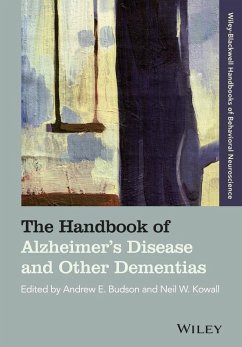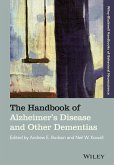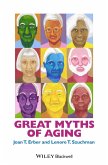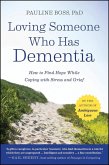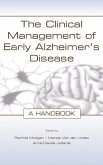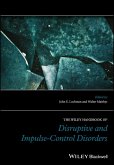The Handbook of Alzheimer's Disease and Other Dementias (eBook, ePUB)
Redaktion: Budson, Andrew E.; Kowall, Neil W.


Alle Infos zum eBook verschenken

The Handbook of Alzheimer's Disease and Other Dementias (eBook, ePUB)
Redaktion: Budson, Andrew E.; Kowall, Neil W.
- Format: ePub
- Merkliste
- Auf die Merkliste
- Bewerten Bewerten
- Teilen
- Produkt teilen
- Produkterinnerung
- Produkterinnerung

Hier können Sie sich einloggen

Bitte loggen Sie sich zunächst in Ihr Kundenkonto ein oder registrieren Sie sich bei bücher.de, um das eBook-Abo tolino select nutzen zu können.
The reference is a broad-ranging review of Alzheimer's disease and other dementias from both basic and clinical neuroscience perspectives; it provides scientists and medical professionals with an extensive introduction and an up-to-date review of cutting-edge scientific advances. * Brings the reader up-to-date with cutting-edge developments in this exciting and fast-paced field * Summarizes the most recent developments in the fields of Alzheimer's disease and dementia * Brings together articles from a prominent and international group of contributors * Encompasses a unique range of topics,…mehr
- Geräte: eReader
- mit Kopierschutz
- eBook Hilfe
- Größe: 7.11MB
![The Handbook of Alzheimer's Disease and Other Dementias (eBook, PDF) The Handbook of Alzheimer's Disease and Other Dementias (eBook, PDF)]() The Handbook of Alzheimer's Disease and Other Dementias (eBook, PDF)33,99 €
The Handbook of Alzheimer's Disease and Other Dementias (eBook, PDF)33,99 €![The Psychology of Retirement (eBook, ePUB) The Psychology of Retirement (eBook, ePUB)]() Derek L. MilneThe Psychology of Retirement (eBook, ePUB)20,99 €
Derek L. MilneThe Psychology of Retirement (eBook, ePUB)20,99 €![Great Myths of Aging (eBook, ePUB) Great Myths of Aging (eBook, ePUB)]() Joan T. ErberGreat Myths of Aging (eBook, ePUB)17,99 €
Joan T. ErberGreat Myths of Aging (eBook, ePUB)17,99 €![The Wiley-Blackwell Handbook of Adulthood and Aging (eBook, ePUB) The Wiley-Blackwell Handbook of Adulthood and Aging (eBook, ePUB)]() The Wiley-Blackwell Handbook of Adulthood and Aging (eBook, ePUB)38,99 €
The Wiley-Blackwell Handbook of Adulthood and Aging (eBook, ePUB)38,99 €![Loving Someone Who Has Dementia (eBook, ePUB) Loving Someone Who Has Dementia (eBook, ePUB)]() Pauline BossLoving Someone Who Has Dementia (eBook, ePUB)14,99 €
Pauline BossLoving Someone Who Has Dementia (eBook, ePUB)14,99 €![The Clinical Management of Early Alzheimer's Disease (eBook, ePUB) The Clinical Management of Early Alzheimer's Disease (eBook, ePUB)]() The Clinical Management of Early Alzheimer's Disease (eBook, ePUB)59,95 €
The Clinical Management of Early Alzheimer's Disease (eBook, ePUB)59,95 €![The Wiley Handbook of Disruptive and Impulse-Control Disorders (eBook, ePUB) The Wiley Handbook of Disruptive and Impulse-Control Disorders (eBook, ePUB)]() The Wiley Handbook of Disruptive and Impulse-Control Disorders (eBook, ePUB)145,99 €
The Wiley Handbook of Disruptive and Impulse-Control Disorders (eBook, ePUB)145,99 €-
-
-
Dieser Download kann aus rechtlichen Gründen nur mit Rechnungsadresse in A, B, BG, CY, CZ, D, DK, EW, E, FIN, F, GR, HR, H, IRL, I, LT, L, LR, M, NL, PL, P, R, S, SLO, SK ausgeliefert werden.
- Produktdetails
- Verlag: John Wiley & Sons
- Seitenzahl: 504
- Erscheinungstermin: 9. September 2011
- Englisch
- ISBN-13: 9781444344097
- Artikelnr.: 38308590
- Verlag: John Wiley & Sons
- Seitenzahl: 504
- Erscheinungstermin: 9. September 2011
- Englisch
- ISBN-13: 9781444344097
- Artikelnr.: 38308590
- Herstellerkennzeichnung Die Herstellerinformationen sind derzeit nicht verfügbar.
Foreword xii
Preface xv
Part I Common Dementias 1
1 Alzheimer's Disease 3
Alan M. Mandell and Robert C. Green
2 Vascular Dementia 92
Angela L. Jefferson, Amanda M. Gentile, and Ravi Kahlon
3 Dementia with Lewy Bodies 131
Tamara G. Fong and Daniel Z. Press
4 Frontotemporal Dementia 145
Adam L. Boxer
5 Other Dementias 179
Peter Morin
Part II Pathogenesis and Disease Mechanisms 195
6 Genetic Risk Factors for Dementia 197
Paul Hollingworth and Julie Williams
7 The Neuropathology of the Dementing Disorders 235
Ann C. McKee and Brandon E. Gavett
8 Amyloid Beta Peptide and the Amyloid Cascade Hypothesis 262
Carmela R. Abraham
9 Other Mechanisms of Neurodegeneration 277
Marina Boziki, Vassilis Papaliagkas, and Magda Tsolaki
10 Rational Therapeutics for Alzheimer's Disease and Other Dementias 301
Neil W. Kowall
Part III Cognitive and Behavioral Dysfunction 313
11 Memory Dysfunction in Dementia 315
Andrew E. Budson
12 Language Processing in Dementia 336
Jamie Reilly, Joshua Troche, and Murray Grossman
13 Executive Functioning 369
Robert A. Stern, Stacy L. Andersen, and Brandon E. Gavett
14 Emotion and Behavior in Alzheimer's Disease and Other Dementias 416
Christopher I. Wright
15 Visuospatial Function in Alzheimer's Disease and Related Disorders 457
Alice Cronin-Golomb
16 Sleep and Circadian Rhythms in Dementia 483
David G. Harper
Part IV Neuroimaging in Dementia 505
17 Glimpses of the Living Brain with Alzheimer's Disease 507
Ronald J. Killiany
18 Functional MRI in Alzheimer's Disease and Other Dementias 535
Maija Pihlajamäki and Reisa A. Sperling
19 Molecular Neuroimaging of the Dementias 557
Bradford C. Dickerson
20 Using EEG and MEG to Understand Brain Physiology in Alzheimer's Disease
and Related Dementias 575
Brandon A. Ally
Index 604
Foreword xii
Preface xv
Part I Common Dementias 1
1 Alzheimer's Disease 3
Alan M. Mandell and Robert C. Green
2 Vascular Dementia 92
Angela L. Jefferson, Amanda M. Gentile, and Ravi Kahlon
3 Dementia with Lewy Bodies 131
Tamara G. Fong and Daniel Z. Press
4 Frontotemporal Dementia 145
Adam L. Boxer
5 Other Dementias 179
Peter Morin
Part II Pathogenesis and Disease Mechanisms 195
6 Genetic Risk Factors for Dementia 197
Paul Hollingworth and Julie Williams
7 The Neuropathology of the Dementing Disorders 235
Ann C. McKee and Brandon E. Gavett
8 Amyloid Beta Peptide and the Amyloid Cascade Hypothesis 262
Carmela R. Abraham
9 Other Mechanisms of Neurodegeneration 277
Marina Boziki, Vassilis Papaliagkas, and Magda Tsolaki
10 Rational Therapeutics for Alzheimer's Disease and Other Dementias 301
Neil W. Kowall
Part III Cognitive and Behavioral Dysfunction 313
11 Memory Dysfunction in Dementia 315
Andrew E. Budson
12 Language Processing in Dementia 336
Jamie Reilly, Joshua Troche, and Murray Grossman
13 Executive Functioning 369
Robert A. Stern, Stacy L. Andersen, and Brandon E. Gavett
14 Emotion and Behavior in Alzheimer's Disease and Other Dementias 416
Christopher I. Wright
15 Visuospatial Function in Alzheimer's Disease and Related Disorders 457
Alice Cronin-Golomb
16 Sleep and Circadian Rhythms in Dementia 483
David G. Harper
Part IV Neuroimaging in Dementia 505
17 Glimpses of the Living Brain with Alzheimer's Disease 507
Ronald J. Killiany
18 Functional MRI in Alzheimer's Disease and Other Dementias 535
Maija Pihlajamäki and Reisa A. Sperling
19 Molecular Neuroimaging of the Dementias 557
Bradford C. Dickerson
20 Using EEG and MEG to Understand Brain Physiology in Alzheimer's Disease
and Related Dementias 575
Brandon A. Ally
Index 604
